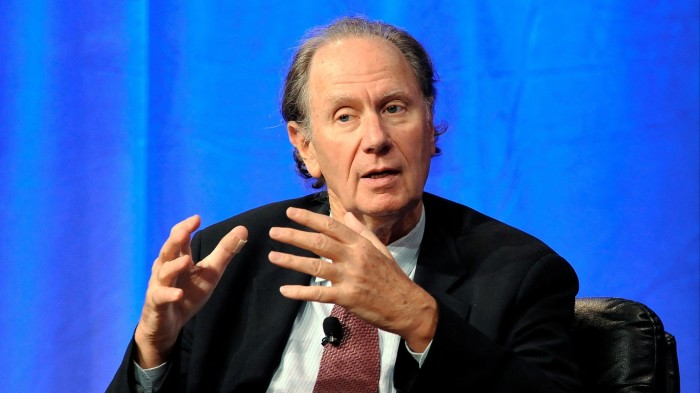When Texas Pacific Group hosted its annual investor meetings, co-founder David Bonderman insisted they not be the dry private equity seminars held by New York rivals in hotel ballrooms.
Bonderman favoured locations such as the Arizona resort town of Scottsdale and ran the events like his famed birthday bashes, hiring stars including the likes of Paul McCartney and Sheryl Crow to give outdoor concerts, handing out CDs or iPods containing playlists he had curated himself.
The lawyer-turned-investor, who died last week aged 82, founded TPG in 1992 and within a few years had become one of the private equity industry’s seminal figures. While part of a generation of luminaries such as KKR’s Henry Kravis and Blackstone’s Stephen Schwarzman, he marched to his own beat throughout his career, maintaining many interests beyond just chasing the last dollar.
Born in 1942 in Los Angeles, Bonderman made his way to Seattle to take a degree in Russian studies at the University of Washington, working on the side as a ticket taker at the city’s landmark Space Needle tower, later winning an international travel fellowship. He later enrolled at Harvard Law School and did a stint at the American University in Cairo, where he studied the Arabic language and Islamic law.
After graduating from Harvard in 1966, Bonderman taught law at Tulane University in New Orleans and then joined the civil rights division at the US Department of Justice under President Lyndon Johnson.
In the early 1970s, he landed at powerhouse Washington DC law firm Arnold & Porter. His accomplishments there included a 1983 appearance before the US Supreme Court where he sparred with Justice Sandra Day O’Connor as he secured a reversal of the conviction of Raymond Dirks, a stock analyst charged with insider trading.
Among his legal specialities, Bonderman became an expert in historic landmark preservations. A successful effort to save New York’s beaux arts masterpiece Grand Central station earned the attention of Texas oil tycoon Robert Bass, who later convinced him to move to Fort Worth to help run the Bass family investment firm, where his biggest win was the lucrative purchase of distressed American Savings & Loan.
Bass proved an incubator of several future Wall Street titans, with Bonderman sitting among Tom Barrack and Marc Lasry, to name two. But his tightest relationship was with 20-something former investment banker Jim Coulter.
In 1992, the two created a vehicle they named Air Partners to buy Continental Airlines, a bold move given the series of bankruptcies that had plagued the sector. They turned the carrier around and Air Partners remains easily the best-returning fund in the history of TPG, which was formally launched in 1993, with an annualised gain of 81 per cent.
TPG stood out from contemporaries such as KKR, Blackstone, Carlyle and Apollo. For one, its principal offices were not in New York but in Fort Worth and San Francisco. The firm was also quick to see the opportunity in a globalising Asia and rather than simply relying on financial engineering, Coulter and Bonderman would focus on major operational changes to turbocharge businesses.
“David’s approach was that investing is problem-solving,” Coulter said. “At that point, private equity investing was just a finance transaction.”
TPG would go on to acquire household names including Burger King, J Crew and Neiman Marcus. By the mid-2000s, it was among the handful of juggernauts with the firepower to pursue $20bn and $30bn takeovers.
But the 2008 financial crisis delivered a heavy blow. TPG had been behind the $25bn-plus megabuyouts of Texas utility TXU and casino chain Caesars Entertainment, both of which went bankrupt in the ensuing years.
A $1bn rescue financing in 2008 for Seattle bank Washington Mutual was wiped out within months. TPG would never prosper again to the extent of KKR, Blackstone and Apollo.
There were legal scrapes, too. TPG settled civil charges along with several other buyout titans over collusive bidding in 2000s buyouts. Creditors of Caesars took control of the company after allegations of multibillion-dollar asset stripping by TPG and its deal partner, Apollo. More recently, Bonderman’s family investment firm backed a money manager accused by regulators and investors of fraud, allegations that led to a civil settlement.
But Bonderman had his share of big wins in the 2010s, including with TPG-backed disrupters Uber, Airbnb and Spotify. Gary Loveman, former Caesars chief executive, told the Financial Times that, more than any other private equity investor, Bonderman pondered ways to revolutionise industries, citing as an example his long-standing association with Ryanair and his affection for its founder Michael O’Leary.
“David was an intellectual — fascinated by the pursuit, critique and debate of compelling ideas,” Loveman said. “He had a level of intellectual curiosity that was not bound by convention or established practice.”
TPG invested in Ryanair in 1996 and Bonderman served as the airline’s chair for more than two decades, a period in which it grew from a small regional carrier into Europe’s biggest airline by passenger numbers.
O’Leary told the FT that “none of Ryanair’s success would have been possible without his sage but prescient advice, his calm and visionary strategic thinking, and his willingness to wear dishevelled clothes and attend Rolling Stones concerts”.
Alongside several successful commercial airline deals, Bonderman’s success allowed him to jet set on his own personal plane, something he did with gusto.
“He had the most well travelled private jet on earth,” said Tony James, a close friend and former executive vice-chair of Blackstone, who set out with Bonderman to regions as varied as Mongolia, Cuba, South America and Australia.
Upon landing, he added, Bonderman would always be steeped in his destination’s culture and history.
Among causes he backed were several environmental and conservation charities — in Africa he purchased jeeps to help wildlife rangers chase off poachers, vehicles that became known as “Bondo mobiles”.
In a nod to his travels in the 1960s, Bonderman’s philanthropy also includes endowed student travel fellowships at the University of Washington, the University of Michigan and American University in Cairo.
Bonderman is survived by five children and three grandchildren.
Additional reporting from Philip Georgiadis



 Gift posts are here! As a valued subscriber, you can share up to 10 ImpactAlpha articles each month with up […]
Gift posts are here! As a valued subscriber, you can share up to 10 ImpactAlpha articles each month with up […]
